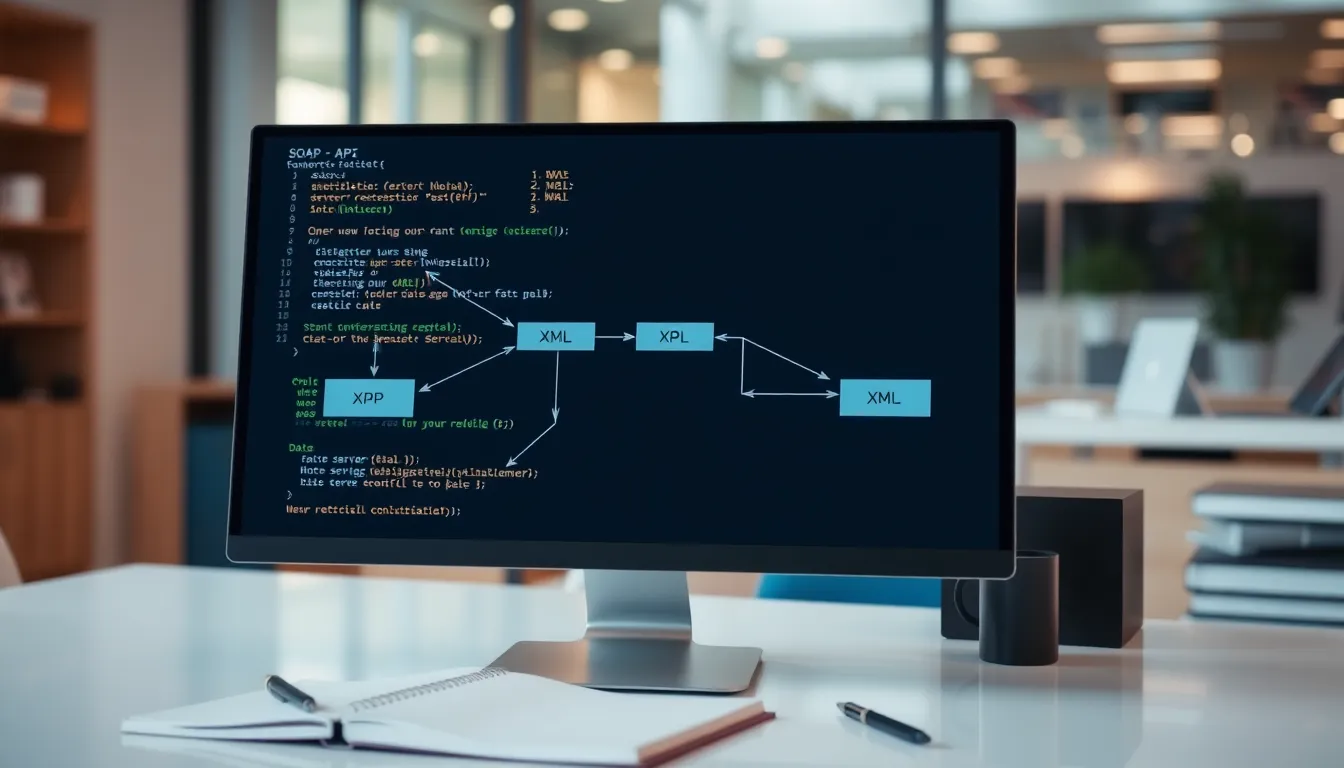In the ever-evolving tech landscape, APIs are the unsung heroes of seamless communication between software applications. Among these, the SOAP API stands out like the dependable friend who always shows up on time—structured, reliable, and a bit old-school. While REST APIs might be the cool kids on the block, SOAP brings a level of rigor and security that many businesses crave.
Imagine trying to order a pizza without an API. You’d be shouting your order into the void, hoping someone hears you. SOAP API is the delivery guy who not only takes your order but ensures it arrives hot and fresh, complete with all the toppings you requested. With its strict protocols and XML messaging, SOAP API guarantees that your data is delivered safely and efficiently. So, let’s dive into the world of SOAP and discover why it still deserves a seat at the table in today’s API-driven economy.
Table of Contents
ToggleWhat Is SOAP API?
SOAP API, or Simple Object Access Protocol, stands as a protocol for exchanging structured information in web services. It utilizes XML for message format, ensuring a consistent method of communication across different systems. Many organizations prefer SOAP due to its reliance on strict standards and protocols, which enhance reliability.
Messages sent via SOAP API follow a specific format, structured into an envelope that contains headers and a body. This envelope structure allows for various message types, making it versatile for numerous applications. Each SOAP message encapsulates essential information, such as the method to invoke and the parameters required.
Security plays a critical role in the design of SOAP API. It supports WS-Security, which offers features such as message integrity and confidentiality. These security measures protect the communication, making SOAP a trusted choice for industries that prioritize data protection.
Error handling in SOAP API is also robust, with built-in features for returning faults. This capability enables users to identify issues efficiently, enhancing the overall user experience. Many businesses find this level of detail in error reporting advantageous.
Overall, SOAP API provides a structured, secure, and reliable framework for exchanging information between applications. Its comprehensive features appeal particularly to organizations prioritizing data integrity and strict communication protocols.
Key Features of SOAP API

SOAP API stands out with several key features that enhance its functionality and reliability in web services.
Protocol Standards
SOAP adheres to strict protocol standards defined by the World Wide Web Consortium (W3C). These standards ensure a uniform approach to handling requests and responses across different platforms. Implementation of the SOAP specification enables interoperability among disparate systems. Both developers and businesses benefit from the rigid structure, enhancing consistency in communication. Compatibility with other protocols amplifies its utility in varied environments. Furthermore, the extensive use of XML standards promotes clear and precise data exchange, facilitating efficient interaction between applications.
Data Format
Structured information exchange defines SOAP’s data format. XML serves as the primary format for SOAP messages, allowing a standardized method for data representation. Through XML, message readability improves significantly across platforms. Each message comprises an envelope, headers, and a body, which organizes the content systematically. This organization aids in the seamless transmission of complex data sets. Additionally, support for different encoding styles ensures adaptability to various use cases. Such versatility makes SOAP suitable for applications requiring high levels of data integrity and security.
Advantages of SOAP API
SOAP API provides several advantages that enhance its appeal, particularly in secure and reliable communications.
Security
SOAP API excels in security features. It implements WS-Security for message integrity and confidentiality. Encrypting data ensures sensitive information remains protected during transmission. Many industries, such as finance and healthcare, prioritize security. The ability to create digital signatures further validates message authenticity, reassuring users that information hasn’t been altered. Compliance with standards like HIPAA strengthens confidence in SOAP API’s security measures. Relying on XML for message formatting, SOAP allows for structured security practices, promoting safe data exchange across platforms.
Reliability
Reliability stands as a cornerstone of SOAP API’s design. Strict standards defined by the World Wide Web Consortium (W3C) ensure consistent handling of requests and responses. Maintaining this uniform approach enhances interoperability among varied systems. This reliability proves crucial in complex environments where multiple components interact. Implementing robust error handling allows quick identification and resolution of issues. The structured message format promotes orderly data transmission, reducing the likelihood of communication failures. Enhanced reliability fosters trust among developers and organizations, making SOAP API a preferred choice for mission-critical applications.
Use Cases of SOAP API
SOAP API serves various practical purposes in diverse industries. Its structured approach benefits applications requiring high reliability and security.
Enterprise Applications
Enterprise applications frequently leverage SOAP API for crucial operations. With its strict standards, it ensures consistent data exchange among internal systems. Many organizations utilize SOAP to integrate enterprise resource planning (ERP) and customer relationship management (CRM) platforms. This integration facilitates real-time data updates, enabling organizations to maintain accurate information across departments. Moreover, SOAP API’s enhanced security features meet the compliance requirements of sectors like finance and healthcare. These attributes make it a reliable choice for businesses prioritizing secure transactions and interoperability.
Web Services Integration
Web services integration often relies on SOAP API’s robust framework. By providing a standardized messaging protocol, it supports different applications communicating seamlessly. Various platforms, including .NET and Java, utilize SOAP for service-oriented architecture (SOA) implementations. Many developers appreciate its ability to handle complex data structures, enabling the integration of diverse services. As a result, organizations experience improved access to data and services across disparate systems. SOAP API also meets the needs of industries that require extensive error handling and transactional capability, making it essential for reliable web service communication.
SOAP API stands out as a robust solution for organizations seeking secure and reliable communication between applications. Its structured approach and adherence to strict protocols ensure that data integrity and confidentiality are maintained across various industries. With features like WS-Security and comprehensive error handling, SOAP API not only meets the demands of complex environments but also fosters trust among developers.
As businesses continue to rely on seamless data exchange, the significance of SOAP API remains evident. Its ability to integrate diverse systems and facilitate real-time updates makes it an invaluable asset in today’s API-driven economy. By choosing SOAP API, organizations position themselves to navigate the challenges of modern communication with confidence and efficiency.
